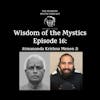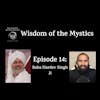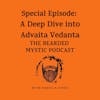Thoughts on the Bhagavad Gita: (Chapter 12: Verse 12 - 14)
This episode discusses the 12th chapter of the Bhagavad Gita, specifically verses 12 - 14.
Translation used: The Bhagavad Gita Comes Alive: A Radical Translation by Jeffrey Armstrong
If you enjoyed listening to the 82nd episode of the Thoughts on The Bhagavad Gita and want to listen to more episodes like this on the Bhagavad Gita, or on Non-Duality, or the wisdom of the Mystics please follow/subscribe to this Podcast. New episodes are uploaded every Sunday.
Thoughts on the Upanishads, Conversations with the Bearded Mystic, Guided Meditations, and much more only on Patreon, Buzzsprout Subscriptions, Apple Podcast Subscriptions and Supercast.
Patreon: Support The Bearded Mystic Podcast and get ad-free, bonus episodes along with many more benefits:
https://www.patreon.com/thebeardedmysticpodcast
Buzzsprout Subscriptions: Support The Bearded Mystic Podcast and get ad-free, bonus episodes: https://www.buzzsprout.com/1800416/subscribe
Direct & Unfiltered with The Bearded Mystic is a great format to ask The Bearded Mystic (Rahul) whatever question you have in your mind. Submit your question by completing this survey please.
Join The Bearded Mystic Podcast Discussion Group on Whatsapp: https://chat.whatsapp.com/GcCnyrjQwLuEPHBaVA6q9L
Be notified of my weekly virtual meditation session followed by a Q&A Discussion via zoom (Notifications only):
https://chat.whatsapp.com/DcdnuDMeRnW53E0seVp28b
If you would like a one-on-one meeting with me via Zoom, book here:
https://calendly.com/thebeardedmysticpodcast/1on1meetings
Please rate and write a review for this Podcast: https://www.thebeardedmysticpodcast.com/reviews/new/
You can follow me and contact me on social media:
Website: https://www.thebeardedmysticpodcast.com
TikTok: https://vm.tiktok.com/ZMdk3HPJh/
Instagram: https://www.instagram.com/thebeardedmysticpodcast/
Youtube: https://www.youtube.com/c/TheBeardedMysticPodcast/
Twitter: https://twitter.com/bearded_mystic
Facebook: https://www.facebook.com/The-Bearded-Mystic-Podcast
Rahul N Singh:
Hello and welcome to The Bearded Mystic Podcast and I'm your host Rahul N Singh. Thank you for taking out the time today to either watch or listen to this podcast episode. If you are really interested in supporting The Bearded Mystic Podcast, and you've found great benefit in listening or watching these episodes, then please do support this podcast on Patreon where you can get ad free and bonus episodes along with other benefits depending on the tier that you select. Your support means everything, and it really does help the podcast keep running efficiently and smoothly, and also widens the audience that this message can reach to. If you would like to know more about it, the details are in the show notes and video description below. On Saturdays at 11:00 AM Eastern Standard Time there is a free virtual meditation session along with discussion and Q&A. If you're interested in meditating with us as a community, then you can find out the details in the show notes and video description below. Please do like, comment, and subscribe if you're watching this on YouTube and if you're listening to this on your favorite podcast streaming app, then please do give this podcast a five star rating. It helps the podcast get up in the charts and allows the algorithm to bring this podcast to new listeners and also do review the podcast if you can and make sure you do follow or subscribe to keep getting future episodes. Today we will be continuing on with my thoughts on the Bhagavad Gita and we will be looking at chapter 12 verses 12 to verse 14. Let's get started with verse 12. Just to give a recap, we've been going through the path of devotion, the way of devotion, and we've been seeing how Sri Krishna has given us practices that will match our state of mind, that we can easily try to practice. We're continuing on with that spirit to understand what path is better, gyana or bhakti? And Sri Krishna is answering this question. Gyana Yog, the cultivation of transcendental knowledge, is better than the mechanical practice of Yoga asana. Yogic meditation upon me as the Supreme Being is even better than Gyana Yog. Still, better than meditation is complete detachment from the phala, fruits of action, because it establishes one in shanti, which is true and lasting contentment or peace. So let's look at the first part of the verse, it's a very interesting one. He says Gyana yog, the cultivation of transcendental knowledge, is better than the mechanical practice of yoga asana. This, if you want to really annoy yoga studios that are... Just doing yoga asanas, they're not looking at the philosophy of yoga or even, they don't even know about Patanjali yoga sutras This verse is something that will annoy them because here Sri Krishna is saying that these people that go to a yoga studio and they just do these physical exercises which is these asanas, these yoga asanas, they need to know that Gyana is much better. So understanding the philosophy of Yoga is much more important than just doing the physical exercises. Yes, the physical exercises, it's all good. It's very healthy for the body, but that's it. If, if it's just for the physical exercises, then it's not Yoga. With yoga, we need to have philosophy, we need to have knowledge, we need to have wisdom. That's why Gyana is essential. So that's why he is saying Gyana is better. We need to continuously study the scriptures, listen to the divine words in Satsang, and this can be done either through a YouTube video, on social media, on a podcast, reading a book, anything that will strengthen our intellect is very important. And when our intellect is strong, and it is established that the real is changeless, formless, and that is what we really are, then we have gone into the territory of Gyana Yog. And this Gyana Yog will literally be the cultivation of this transcendental knowledge. So it's the knowledge that allows us to transcend the name and form because it tells us that there is only Brahman. This knowledge will transcend us from form to formless, body identity to oneness because it gives us the insight into Brahman and that's why Gyana Yoga is much better than Yoga asana. Then he says, yogic meditation upon me as the Supreme Being is even better than Gyana Yoga. Being able to completely have union with the Supreme Being is better than Gyana Yog. Remember Gyana Yog can just be something in the mind. It can, it may not be something we practice. Or when we come back into the world, we find that it all comes flooding back. And the very things that we didn't address are starting to unravel again. For example, you keep reading and you think you've understood, then you go back to the world, somebody annoys you, what happens? You lose all peace. If we are just studying the scriptures, but not applying, if we're just listening to holy words, but not practicing, then Gyana Yog is just a burden and therefore that's why Sri Krishna says it's better to stay away from all that and just focus our every bit of attention on this Formless or on the Supreme Being which is Brahman or our isht-devta. Then he says, still better than meditation is complete detachment from the phala, the fruits of actions because it establishes one in shanti, which is true and lasting peacefulness or contentment. As much as it is important to meditate, and Sri Krishna is not saying that we should not do yogic meditation, we should, but we have to live our lives, right? We have to still function in the world, we still have to go out and earn a living, or go out and earn a degree, or go out and do better in, in our studies, or learn more in life. You can only meditate for a certain number of hours, you have to eat, you have to drink, you have to go to the restroom, you have to, uh, take a shower, there's only so much time you can meditate, so that's one thing, and then the other aspect is that we have a lifestyle to maintain, no matter what, we all live a certain way of life, so it would be easier to not only just meditate, but also completely detach from the fruits of those actions that we do, whatever we do, we don't need to think about the fruits of it. Whether the results are positive or negative, we just don't make it our identity, nor can we associate that this'me' is getting the results. We abstain from such thinking. Remember that all fruits of our actions are ripe and ready, so let them be and relax about the timing. There's no favour going on from some god out there. Whatever actions we do, so we reap. Very simple. And when our actions are ready to present its fruit, it will be the best time. Never ask for actions to present its fruit when it's unripe. There's no need for that. That's why Sri Krishna says, one should have complete detachment to the fruits of those actions. You earn money from going to work? Good. Be detached. Do not be like, this is how much salary I make. This is how much I've learned. This is the grades I've got. No, that is ego, that is arrogance, that is pride, and somewhat because of that jealousy will be born, and attachment, that this is my value. Only when we can do this, can we be in true and lasting peacefulness and contentment. For example, if somebody is detached from the fruits of actions, they're calm, they're at peace, they know that this'phala' is not definitive of who they are, they are satisfied with life. If they earn 10, 000, 50, 000, 100, 200, millions, billions, they are satisfied with life. They don't see themselves as the doers, in fact, they just see that Brahman is everything. And that's why they're in peace. Brahman is Shanti, Brahman is Peace. And this peace is unbroken and everlasting. To be truly content with life is a big challenge, but if we are able to do this, we gain so much in life. We gain so much beauty. Let's look at verse 13 and 14 together. One who does not hate any being, who is friendly and compassionate to all living beings, who realises that they own nothing within matter, who does not identify their self with matter, who is not unbalanced by pleasure or pain, who is always patient and who is always contented, who acts as the Atma under all circumstances, whose Manas and Buddhi are permanently fixed upon Me and who is mad bhakta, forever devoted to Me, such a person is most priya or beloved to Me. These are the descriptions of what one should have due to the practice of bhakti yoga. If we are truly doing karma yoga, and we are renouncing all fruits, if we are detached from the fruits of our actions. So, you know, we're not stressed about what we get and what we do not get. We're not anxious. We're not eagerly anticipating. These are the qualities that we see in the person. Let's look at verse 13. One who does not hate any being who is friendly and compassionate to all living beings. First of all, let's establish these are the qualities that we must possess. All of us. We must not hate any beings, even if we fear them. Yeah, even if we think that we are stronger than them. We must not hate them. Every being has a unique position in existence, they have something unique about them. So our nature truly is to love and we give love. How can somebody hate any being when All is Brahman? And they are friendly. Why are they friendly? Because everyone is Brahman. Everyone is the isht-devta. So we're always friendly with others, they're, they're always kind to others. People trust them because they are approachable and non judgmental and they are compassionate to others, they can understand people's pain, they can relate to it and they always seek to understand others and they offer their presence. Wherever they go, people seem to want to be friends with them. When they see them, they see someone full of life. They see someone that gives energy rather than takes energy from them. They see that their nature is so serene and so tranquil. And they're like this to everybody. They have this as their basic mode of operation. One thing I will say here is, yes, it does not mean that one has to get along with everybody. What Sri Krishna is saying here is that on a basic level, you're okay with everyone. You don't have to be friends with everyone. But you have that basic sense of just being nice. Even if somebody is horrible to you, this is very important to understand. Then he says, who realizes that they own nothing within matter. What can we own in this world when we do not exist? When we are the Atma, how can we say we own anything? How can we say we possess anything? So what can we own in this world? We enter empty handed and we will exit empty handed. Nobody who has died has taken any property, wealth with them. Everybody has died with nothing. They entered with nothing, they leave with nothing. But there's one thing that some people can receive at birth and at death. And that is love. If you have love, then that is something you can possess as your own Being, as everyone's Being. So nobody takes their material success with them, nobody. Existence belongs to existence, nothing belongs to me. And if I don't own anything, then I cannot have the identity of I feel rich or I feel poor. I'm in poverty, I'm in excess wealth. One does not do that. One is not anxious, do I keep my house, do I keep my money, do I put things in my savings account, do I invest here, do I... One may do all those things, but one doesn't stress, one is not anxious, one is not worried. One is forever calm because they don't own anything, they know they own nothing within matter. Eventually they're going to die and it doesn't matter. Frankly, I mean it sounds really, um, morbid but it's true. And they said who does not identify their self with matter, meaning with the body, with the mind. We do not identify our true self with matter, with the body. We discover that we are not made of the five elements. So we fully understand and discover and unveil that we are not this body, nor are we the mind. So what are we? We are this Witness Consciousness. We are this Formless Awareness. We are beyond any matter that is subject to change. We are that Changeless Self. So we do not identify our identity with matter, with anything that is material. Who is not unbalanced by pleasure or pain This is a challenge for a lot of people We are never dismayed by pain Nor are we ecstatic at other people's pain Nor are we overjoyed when we are in pleasure nor are we upset that others are getting pleasure. We do not lose that state of mind. Things come to us that are pleasurable, fine. Things come to us that are painful, that's fine. Our state of mind is balanced. We do not to and fro. We don't seek one over the other. It's not that when something painful happens, we suddenly lose all our spirituality. Or we get what we want, we get what we desire, and we lose all our spirituality. That shouldn't be the way. And then the next line, who is always patient. They're always patient with themselves and with others. They never lose their temper, they're calm, composed, and they never hanker after results quickly. They're not forcing results to happen. Nor do they think that things should go their way, if things are moving slow. You know, so many people are rushing. This needs to be done, this needs to be done. And they know. They are patient. You know, in Indian philosophy, we have this. And it's also in the Dao De Jing. That the Dao does not do, yet everything gets done. So, they are always patient. They know everything will get done. Everything will get completed, which is important. So there's no need to stress, so they're always patient. For the world, things may be moving slow, but for you, you know it's the right moment, the right time. Then verse 14, One who is always contented, they're always in contentment. They do not require or do they feel the need to acquire anything anymore. Everything they possess is great, and even if they don't possess something, it doesn't bother them. They're fully content. And this is the most important, who acts as the Atma under all circumstances. So we remain as this Purusha, always. We remain as the Witness Consciousness, always. Remember the Atma is Changeless and Formless. We remain in that formless awareness always. We, for example, in sukha and dukha, in comfort or in distress, they are always the Observer I am the Atma, this is happening to my body and mind It's not Me. They act as the Observer. So they observe all this phenomena and they respond and work within this phenomena of this world, of this universe, and yet they remain unaffected like I mentioned before in other episodes like a screen that has had numerous films played upon it. That is the Atma. So we have to act as the Atma under all circumstances. Somebody says, you did this. You know who really did it. You don't have to say, oh, I, the Atma did it. No, you don't have to say that. You know who did it. Atma. Somebody says, you did this wrong thing. The Atma did it. Then he says, whose manas and buddhi are permanently fixed upon Me. Me meaning the isht-devta or Saguna Brahman or Nirguna Brahman. So our emotions are focused on Brahman, we keep our emotions directed upon Brahman, our intellect is focused upon Brahman, our discernment is always about discovering the real, we always seek the company of the Wise and we study the scriptures to strengthen our intellect. That's what we do. So we're permanently fixed upon this one Brahman. The intellect is constantly, it reads something, sees something, hears something, it goes straight to the divine, it goes straight to Brahman. Our emotions go one way, we then renounce our emotions and we focus upon Brahman. We start thinking of one thing and we notice our thoughts are incessantly chattering, we go back to brahman. What does that mean? We remain permanently fixed upon Brahman. We don't look towards anything else. It's not temporary. Everything we do is about strengthening our intellect. Everything. So these two lines we just discussed, who acts as the Atma under all circumstances, and whose Manas and Buddhi are permanently fixed upon Me. So every aspect of life, is focused on the Atma. Once you understand your true identity, then it's easy. This is Advaita Vedanta, it's removing avidya, removing ignorance. This is the only thing that needs to happen. And then Sri Krishna says And who is mad bhakta, forever devoted to Me such a person is most priya or beloved to Me And we are a fervent bhakta, always devoted to Brahman. Everything we do is devoted to Brahman. We can't think of life without Brahman Everything is a reminder of Brahman and everything is Brahman. That is a true devotee. That's what Mad Bhakta means. Forever devoted to Me. It is unfluctuating, unwavering, permanently fixed. We sing and dance to a tune that nobody else can hear, that is a Mad Bhakta. They're always in this ecstatic love with their isht-devta. Such a person is the most beloved to Brahman. Such a person is the most beloved to their Guru. Such a person is celebrated by the Devas. And such a person is an inspiration for humankind. This is the importance of such a person. So, Sri Krishna, in these verses today, one has answered why Gyana Yog is better than Yoga Asana, and why focus doing yogic meditation is better than Gyana Yog, and then renouncing our fruits of our actions to Brahman is the highest or the easiest and then He has told us what qualities are seen in that person. So now we know what we need to look for. So we look at verses 13 and 14 and we said this is how I want to be, this is how I want to remain, this is how I want to fix myself. Then you can do this checklist. Do I hate anybody? Am I friendly to everybody? Am I compassionate to all living beings? Do I realise that I own nothing within this world? Do I identify myself with the body and mind? Am I unbalanced when it comes to pleasure and pain? Am I patient? Am I in contentment? Do I act as the Atma in all circumstances? If I don't, do I do it most of the time? Do I do it sometimes? Do I not do it at all? Is my manas and buddhi, is my mind and intellect permanently fixed upon Brahman? Is it sometimes? A couple of times? When do I? And am I a mad bhakta? Am I forever devoted to Brahman? Am I fervently devoted to Brahman? Am I ecstatically devoted to Brahman? Therefore, one thing I will say before I end this episode and this is a very important point and I mentioned this before and I'm mentioning it again. Many people will say Krishna, Krishna, Krishna Ram, Ram, Ram, Shiv, Shiv, Shiv. They'll continuously mention the names of the Lord but how many of them can say that to they good how many people can say their guru finds them to be the most beloved they say you are the most dear to Me. It's good saying you love Sri Krishna. It's all good saying you love Guru Nanak Dev Ji. It's good saying you love Jesus. It's good saying that you love your Guru. But has your Guru ever said to you, has Sri Krishna ever said to you, has Guru Nanak Dev Ji ever said to you, has Jesus ever said to you, that you are mine? Or you are one with me? Until this happens, our devotion is not complete. See, when we have an ideal, when we have an isht-devta, we can have a relationship. We can then expect a communication. That if I'm speaking, this has to be listening. And if This speaks, I have to be listening. So in your heart, you will find the answer. These beings, these isht-devtas don't have to be physically alive, they are eternally alive within this Shared Being. Whenever you want, they can appear, and when they speak to you, be ready to hear their messages. Here I'm not talking about channeling spirits, none of that. I understand the mind is doing this, because the whole Shared being is within your mind. I've probably gone a little mystical today, but this is something we can experience. I can say that definitively. It's up to us, if we are willing to go down this path. So that is the end of today's episode. Thank you very much for listening. If you liked what you heard and liked what you watched, please do share this podcast with your friends and family who may enjoy this content. Do follow me on social media to keep getting updates. Join the Bearded Mystic Podcast WhatsApp community group to continue the podcast discussion, details are in the show notes and video description below. If you would like to support the Bearded Mystic Podcast as we discussed earlier, do check out the podcast Patreon page. Your support means everything, and it helps this podcast keep running. Details are in the show notes and video description below. Please do rate this podcast five stars and do give a review either on your favorite podcast, streaming app or on our website. Details are in the show notes and video description below. Please do like and comment on this video and subscribe to this YouTube channel. Do follow or subscribe to this podcast on your favorite podcast streaming app. Thank you very much for listening to this episode. Let's end with the Shanti mantra and the Soham mantra. Soham Soham. I am That. I am That. Aum Shanti Shanti Shanti Aum Peace Peace Peace Namaste.
New to The Bearded Mystic Podcast?
Here are some great episodes to start with. Or, check out episodes by topic.















